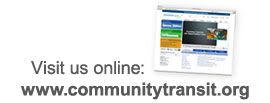The Washington State Legislature began its
2013 session this week, so it’s a good time to review how bus service in Snohomish County is funded. Community Transit will be asking legislators for new funding, or authority to seek additional funding, so it can add bus service after several years of cuts.
Community Transit is a special purpose municipal corporation, separate from the county, cities or state. It was created by voters in 1976 under state authority to provide public transportation service to Snohomish County residents. Our service area, or public transportation benefit area (PTBA), includes unincorporated Snohomish County and all cities in the county except for Everett, which has its own transit agency.
Service is paid for by a 0.9 percent retail sales tax – the state maximum – in those jurisdictions. That’s nine cents on a $10 taxable purchase. In many parts of the county, the sales tax is above 9 percent, so Community Transit gets about one-tenth of that sales tax collected.
When the recession hit in 2008,
sales tax revenues fell as people in the county reduced their buying, especially on big-ticket items like homes and cars. Tax revenue for transit dropped 18 percent that first year and pretty much stayed at that level for four years. In real dollars, that meant about $14 million less money each year.
After cutting internal costs, reducing administrative staff and freezing wages, Community Transit implemented two service cuts, reducing bus service by 37 percent and laying off 206 employees. Those painful actions have hopefully put the worst behind us; now it is a matter of funding new service.
Meanwhile, modest fare increases help keep pace with inflation. The $1.75 fare for local bus service pays for less than 20 percent of the cost of a local trip.
The extra 25-cent increase in February will bring that farebox recovery up to about 21 percent.
While people’s buying habits have started to improve, 2012 revenues were still $10 million below 2007 levels. At this rate, it will take several years until there is enough guaranteed sales tax revenue to add significant service.
That is why new funding is needed to add service.
This year we are asking the state for direct funding for transit operations. That may be a pie-in-the-sky request, but before Initiative 695, the state provided directly about 30 percent of transit service funding. Today, that state funding is about 2 percent, some of which comes through competitive grants that are not guaranteed.
We are also asking the state for a local option – the authority to ask our voters to fund service. Two years ago, the state gave King County Metro authority for a
$20 car tab fee that kept Metro from making some major service cuts. We’ll see what legislators are willing to support in terms of transit funding this year.







